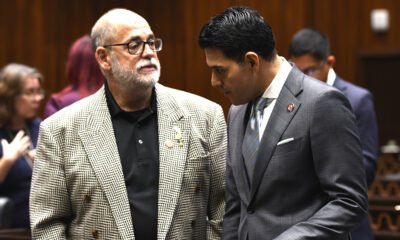Fashion
10 Years of The Foilies: EFF Uncovers Government Games to Sidestep Transparency

In 2015, the launch of OpenAI, a viral dress debate, and a landmark Supreme Court ruling on same-sex marriage marked a pivotal year. It also saw the inception of The Foilies, an annual report by the Electronic Frontier Foundation (EFF) that humorously criticizes government agencies for their unreasonable responses to Freedom of Information Act (FOIA) requests. Despite the passage of time, the trend of authorities sidestepping transparency continues unabated.
The EFF, in collaboration with MuckRock, has chronicled and mocked instances of FOIA failures over the years. Through efforts with AAN Publishers, these cases have been highlighted across various independent news outlets during Sunshine Week, an initiative fostering awareness about public records access. As we reflect on the most absurd cases from the past decade, it appears that challenges to government transparency may only worsen moving forward.
The U.S. Department of Defense (DOD) earned the dubious distinction of having the most outrageous FOIA fee in 2016. An inquiry by Martin Peck regarding the quantity of “HotPlug” devices led to an outlandish estimate of $660 million in costs and over 15 million labor hours, due to a non-searchable document system. This absurdity underscores a pattern of agencies inflating fees to dissuade requests.
In other notable cases, officials in Seattle quoted a citizen $33 million for email metadata before reducing it to $40, while the Rochester Community Schools District in Michigan shocked parents with a staggering estimated fee of $18,641,345 for records they sought regarding alleged surveillance.
The Willacy County Sheriff’s Office in Texas faced ridicule when it billed the Houston Chronicle $98.40 for Wite-Out used during the redaction of crime data, illustrating the often comical lengths agencies will go to avoid transparency.
The FBI has earned infamy as the most criticized agency over the past decade, accumulating eight Foilies. Its longstanding resistance to FOIA requests was highlighted by revelations of its surveillance on the National Security Archive since at least 1989, aiming to obstruct transparency efforts.
Chicago has been repeatedly called out for its hostility toward public information requests. Former Mayor Lori Lightfoot claimed in April 2020 that the city could either manage FOIA requests or focus on pandemic response, suggesting that the former would detract from critical public health work—an assertion widely dismissed as ludicrous.
The Chicago Police Department, in particular, has garnered a reputation for obstructing information access, even during critical incidents involving innocent civilians. The department was dubbed “The Hardest Department to FOIA” in 2021 after numerous nominations for failing to release records related to police misconduct.
As we approach the next decade, even more FOIA horror stories seem inevitable. The need for transparency remains crucial in promoting accountability within public institutions. Stay tuned for The Foilies 2025, which promises to continue this important dialogue.


















